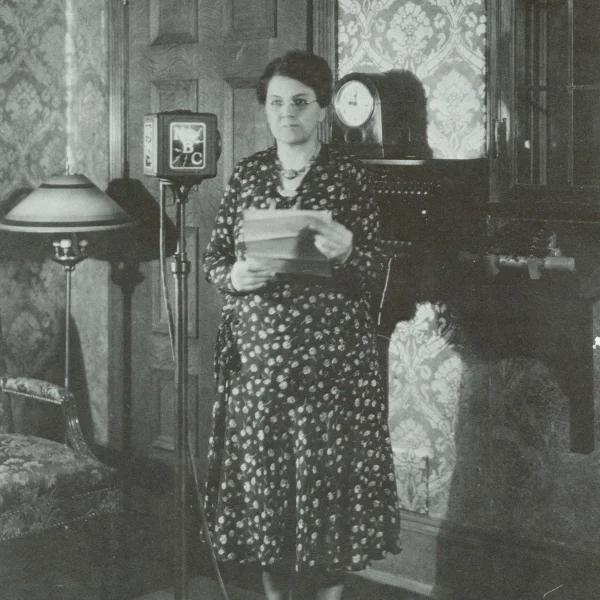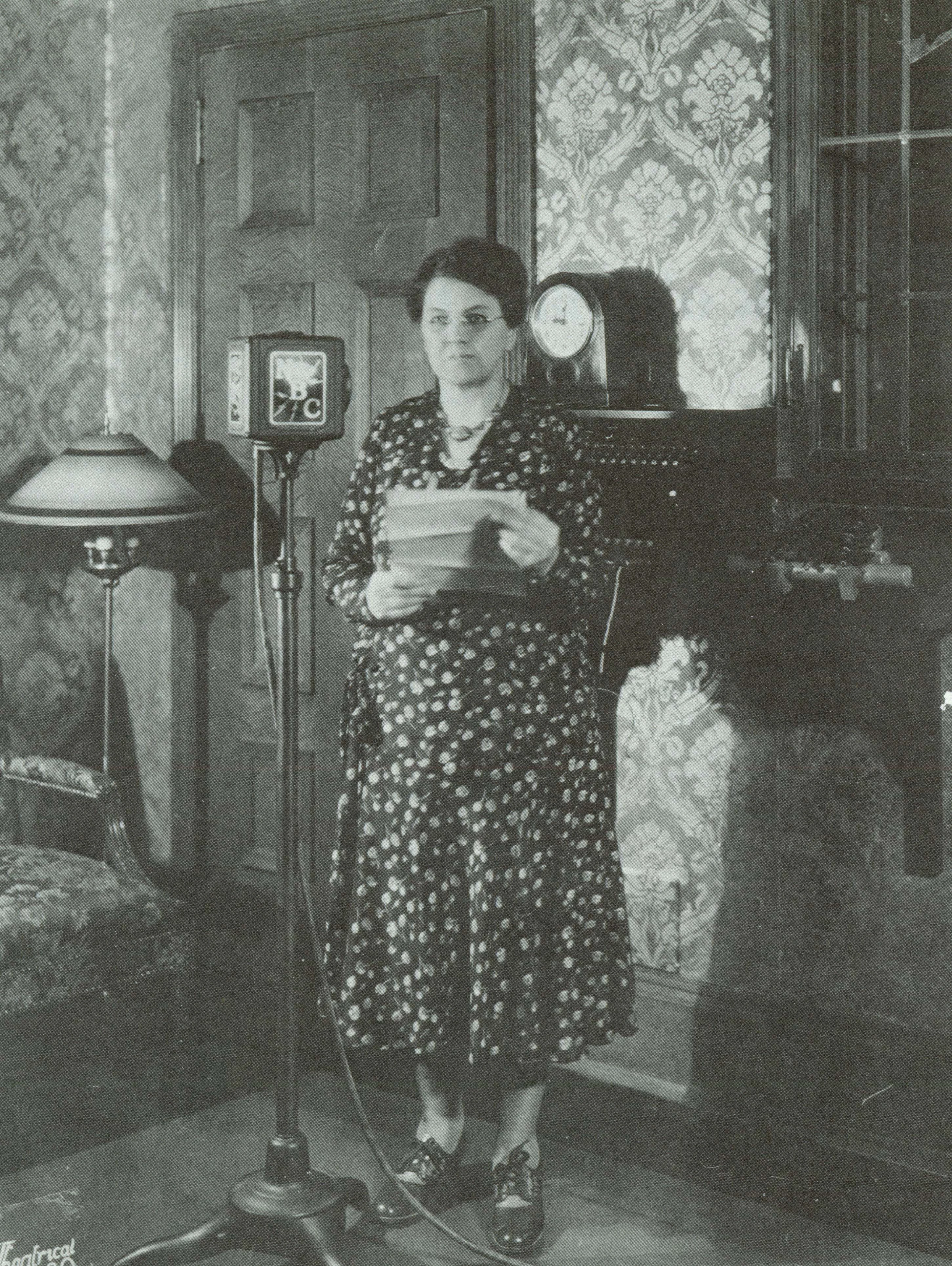Clara Brian spent 25 years traveling to every corner of the McLean County countryside with the goal of improving the lives of rural homemakers and their families.
Her career as McLean County’s first Home Bureau adviser, a role that involved preaching the secular gospel of practical education, science and modernization to farm folk, encompassed two world wars, a prolonged slump in the farm economy and the Great Depression.
This remarkable story is one of many told in the newly opened McLean County Museum of History exhibit, “Farming in the Great Corn Belt.”
Brian’s work with farm wives—extolling the virtues of everything from indoor plumbing to up-to-date canning methods and bookkeeping—was far from a traditionalist nod to patriarchy. Rather, as a home economist she sought to uplift the role of homemakers and instill pride in their vital work. The intent was to make women not passive actors in the male-dominated Corn Belt but “change agents” on behalf of modernity and reform.
The interrelated fields of home economics, sociology and social work emerged from the Progressive Era’s embrace of idealism and optimism, and the belief that the application of scientific principles and emerging technological methods could improve both home life and the greater community. Progressive home economists like Brian championed labor-saving devices for their ability to lighten the suffocating workload of farm women and free up time for uplift, whether of the spiritual, moral, or artistic kind.
Raised in Grayville, a community in southeastern Illinois, Brian spent her young adult years in San Jose, Ill. With the death of her mother she kept the family together, and with her sister she ran a millinery shop and then published a weekly newspaper, the San Jose Journal.
Brian attended Illinois Wesleyan University in her thirties, graduating in 1915 with a degree in home economics. She then headed to Salina, Kan. to establish a home economics department at Kansas Wesleyan University. All the while, over several summers, she worked toward a master’s degree in dietetics and nutrition from Columbia University in New York City, completing her degree in the summer of 1919.
County Home Bureaus were part of a wider movement that began in the 1910s to put into the hands of farmers and farm families the practical information found in the mountain of scientific reports and research pouring forth from land grant universities. As county adviser, Brian would travel to township-based Home Bureau clubs known as “units” and demonstrate how the latest findings and programs at the University of Illinois could be applied to the everyday world of Corn Belt farms—from ivy tower to barnyard, one might say.
The McLean County Home Improvement Association (as early Home Bureaus were known) owes its origin to local food conversation efforts during World War I. Brian began her work as county adviser in June 1918, and in her early meetings she educated rural homemakers on wartime rationing of kitchen staples. Topics of her earliest demonstrations included “wheatless bread,” “meatless dinners” and “sugarless desserts.”
As the largest county in the state, area-wise, McLean County posed its own challenges. There were thirty townships within the 1,186 square miles of the county, with some 43,000 of the county’s 68,000 residents living outside the Bloomington-Normal area.
The township units eventually settled on a schedule of holding one all-day meeting each month, with the adviser spending half that day with the unit.
When possible, Brian reached the township units by steam rail or the interurban, but more often than not she had to travel by automobile. The Home Bureau’s first vehicle, a 1918 Ford roadster, was courtesy of a Rotary Club donation. Brian didn’t know how to drive, but after a one-hour lesson behind the wheel she was ready roll!
One of the many things we take for granted today is the ease of auto travel in the Corn Belt countryside. There was nothing easy about it during Brian’s early years as county adviser. Of the more than 2,000 miles of road in McLean County at the time, only around 125 miles were paved and 350 graveled. That meant there were 1,500 miles of dirt road, with much of that reduced to impassable muddy quagmires after heavy rains or snow melt. Over an eleven month period beginning June 1918, Brian totaled 4,654 miles crisscrossing the county, 1,300 by rail and the remaining 3,354 in the Ford roadster.
She served as home adviser until retirement in 1945, though in the 1920s she took a two-year leave of absence to attend the University of Minnesota on a fellowship to study child development and training.
Brian structured her programs within a framework of five general areas of study: food conservation and consumption; health and sanitation; accounting; household “equipment” and management; and textiles.
The Home Bureau philosophy was education through demonstration and display, and advisers were sometimes known as “home demonstration agents.” For a textile class on window treatments, for instance, Brian made use of an ingenious miniature window frame to show how to measure and hang draperies and curtains.
Never without her folding 3 x 4 camera, she employed photography to illustrate her many lessons and programs to township units. She would make lantern slides from her photographs and project them at unit meetings—images of well-ordered kitchens; ramshackle, unsanitary outdoor privies; canning equipment; tidy chicken yards; and the like—each one a mini-lesson unto itself. Photographs of children, on the other hand, were often meant to convey the primary “reason why” improvements or reforms were needed in the first place.
During the past several decades there has been an increasing appreciation of Brian’s photographs, offering as they do a window into a lost world of the Corn Belt on the cusp of full-blown mechanization. There is also a gracefulness, an unromanticized beauty to these often stark and earthy images that tells us Clara Brian had a deep empathy and love for her subjects.
One of her more popular program involved home accounting. Based on a University of Illinois-designed system, recordkeeping classes empowered women to better manage their household budgets. Participants would then submit their books to the state for review, receiving in return a written report of their work and some helpful number crunching.
Clara Brian passed away on July 10, 1970, at the age of 93. “Her death reminds us,” noted The Pantagraph at the time, “that not all of the important pioneering in McLean County was limited to the 19th century.”
The Home Bureau survives today as the University of Illinois Extension.
Brian left to the McLean County Museum of History some 500 of her photographic negatives. More than 100 of her photos then appeared in the Museum’s 1989 publication, Places of Pride: The Work and Photography of Clara R. Brian.
Sets of her photographs are exhibited from time to time through the Illinois Arts Council, and of late she’s earned recognition through the Illinois Women Artists Project, a 21st century effort that celebrates painters, sculptors and photographers who worked in Illinois from 1818 to 1980.

